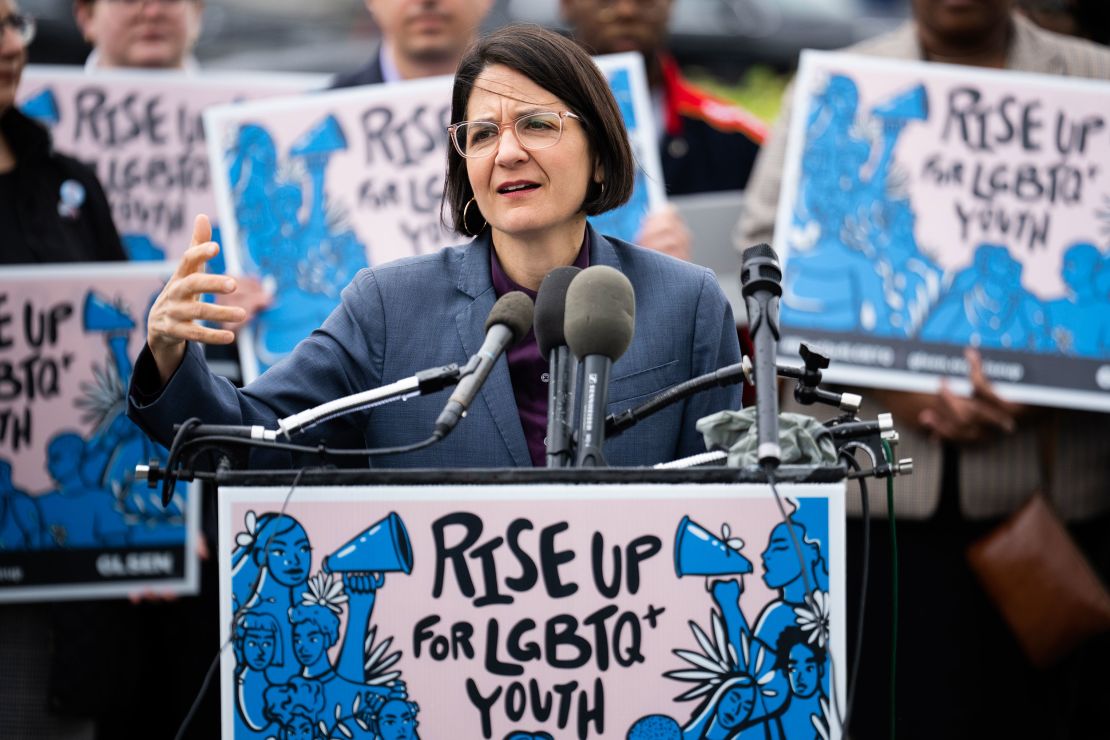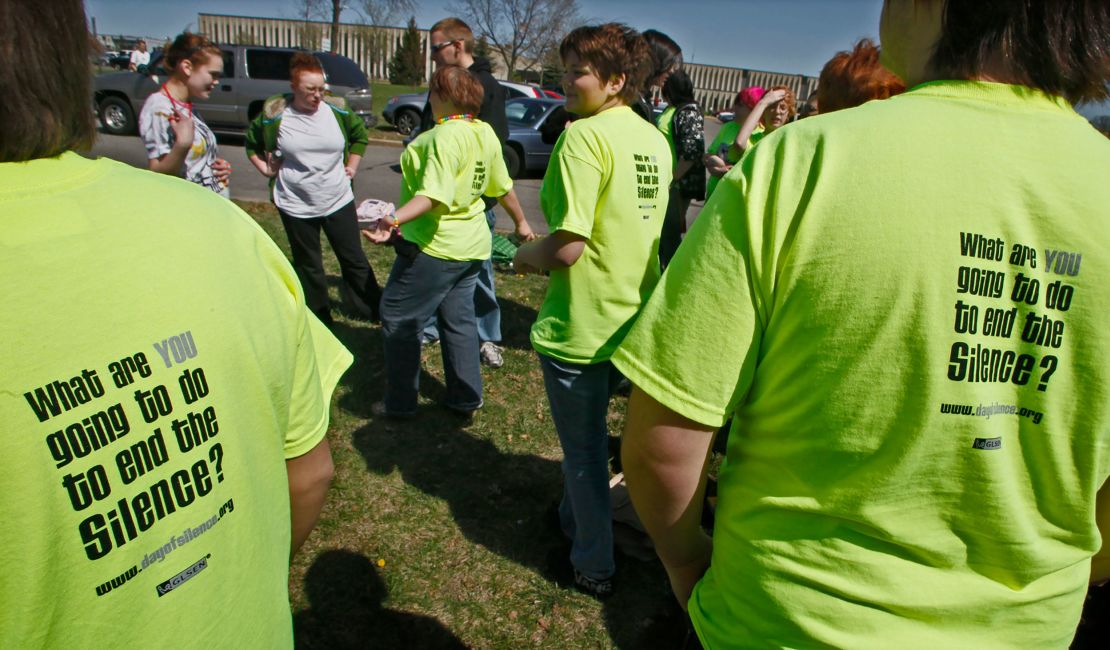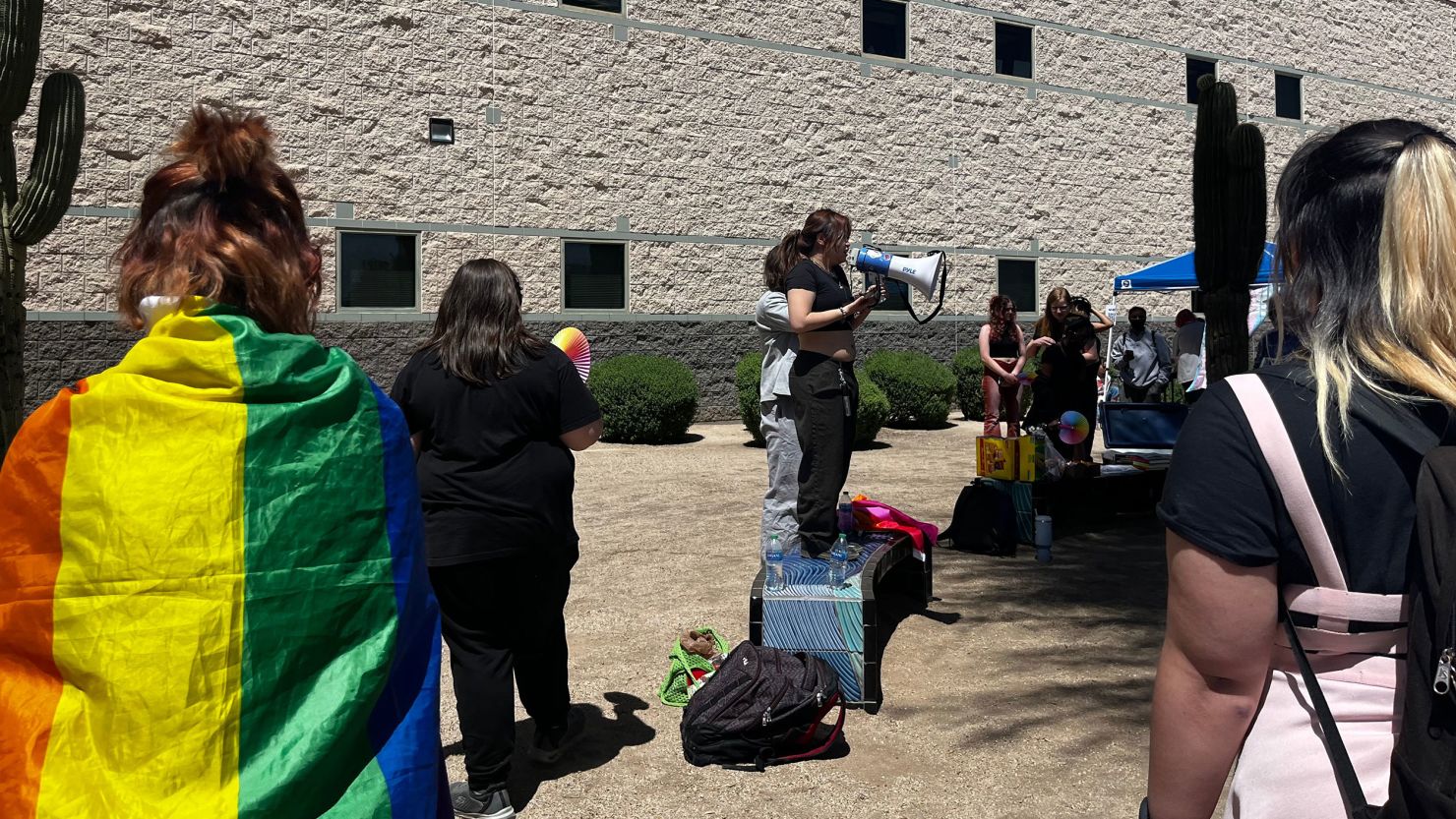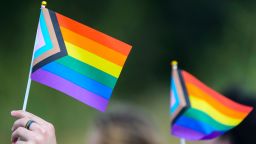After nearly three decades of holding annual silent protests to raise awareness for LGBTQ rights, students across the nation are speaking out Friday spurred by the recent spate of laws aimed at limiting the rights and visibility of LGBTQ Americans.
This year, for the first time, the “Day of Silence” – a yearly event where students take a vow of silence to symbolize the impact of homophobia and the LGBTQ voices that are marginalized by bullying – will morph into a day of action called the “Day of (NO) Silence.”
GLSEN, an LGBTQ education and advocacy organization that works to end intolerance and homophobia in schools, helps organize the student-led demonstrations each year.
Melanie Willingham-Jaggers, executive director of the organization, said from now on the event will encourage students to use their voice to speak out against bigotry and homophobia.
“The imperative to take action has never been greater,” Willingham-Jaggers told CNN. “Instead of observing silence, we are embracing a proactive stance with the Day of (NO) Silence by rising up and taking action.”
Students are encouraged to share their own stories, register to vote and write their representatives to demand changes to Title IX that would further protect LGBTQ youth.
GLSEN said students who feel unsafe or uncomfortable speaking out also have the option to silently protest.
In 2023, at least 510 anti-LGBTQ bills were introduced in state legislatures, according to data from the American Civil Liberties Union. The organization is currently tracking more than 480 bills that restrict LGBTQ rights in the 2024 legislative session.
In 2022, Florida Gov. Ron DeSantis signed the “Parental Rights in Education” bill, which has since been dubbed the “Don’t Say Gay” law because it prohibited classroom instruction on sexual orientation or gender identity in all grades.
Originally, the law only prohibited classroom instruction on sexual orientation or gender identity for students in kindergarten through third grade, but in 2023 the Florida Department of Education approved a proposed rule that would expand that prohibition to all grade levels.
Last month, a legal settlement clarified the scope of law and said students and teachers can discuss sexual orientation and gender identity in classrooms, as long as it is not part of formal instruction.
Cameron Driggers, a 19-year-old gay freshman at the University of Florida, said he feels compelled to speak out because of the “Don’t Say Gay” law, not only for himself but for others.
Driggers said the anti-LGBTQ laws are “like having a target on your back and knowing that you are the ‘other.’”
“I just don’t accept that,” he told CNN. “It certainly doesn’t feel safe or comfortable living in a state that constantly targets my people, like me and my community.”
But, he added, the Day of (NO) Silence helps him to feel hopeful.
“I’m able to see a future that is much more, that’s progressive and actually works for all Floridians,” Driggers said.
Driggers said he plans to join other activists in Orlando Friday to discuss how they can mobilize for LGBTQ rights.
“I continue to organize and empower young people to find hope in themselves so that they know that what they’re fighting for is possible and achievable,” he said.

During a news conference in front of the US Capitol Friday, members of the Congressional Equality Caucus, parents of LGBTQ students and organizers from GLSEN called for inclusive policies that protect LGBTQ students.
Lawmakers also criticized some of their Republican colleagues who have supported what they see as anti-LGBTQ legislation, like the “Protection of Women and Girls in Sports Act,” which passed the GOP-led House last April and sought to prevent transgender women and girls from participating in sports at federally funded schools. The Democratic-controlled Senate did not take up the bill, CNN previously reported.
To mark the annual Day of (No) Silence, Democratic lawmakers also introduced a resolution to support the Rise Up for LGBTQI+ Youth in Schools Initiative. Lawmakers said the resolution was a “call to action to communities across the country to demand equal educational opportunity, basic civil rights protections, and freedom from erasure” for all students in K–12 schools.
Hawaii Sen. Brian Schatz, a Democrat who co-sponsored the resolution, said Democrats wanted to send a clear message: politicians should leave LGBTQ children alone.
“Leave the children alone. Let them be kids. Queer kids, straight kids, somewhere in between. They’re kids,” Schatz said during the news conference. “Let ‘em study, let ‘em go to school, let ‘em walk to school, let ‘em walk to the next class without being bullied or harassed.”
Silence speaks volumes
In April 1996, Maria Pulzetti held a silent protest for LGBTQ rights at the University of Virginia. She said she had no way of knowing her idea would ultimately grow to become a youth movement.
Pulzetti said she was inspired to start the demonstration while taking a class on the Civil Rights Movement and wanted to use a non-violent method to draw attention to voices that were not being heard in her college community.
Students who participated remained silent the entire school day and gave out cards explaining that they were being silent to raise awareness of issues facing the LGBTQ community, like homophobia and discrimination.
The following year, Maria and her classmate, Jesse Gilliam, expanded the “Day of Silence” to other college campuses. Students marked the end of the demonstration with speeches and poetry.
“Being silent itself has never been the goal, that’s always been a tactic,” Gilliam told CNN. “The goal for me [was] to demonstrate to the world how important the voices of LGBTQ youth are, and how damaging homophobia and transphobia is to all of us.”

Gilliam said while the silent demonstration has been effective for many years, both he and Pulzetti understand why students feel compelled to speak out, especially in the current climate.
Pulzetti said she’s heard from “many, many young people that the environment in schools right now – especially in states where there are so many of these anti-LGBTQ bills proposed or already made into law – is that people are frightened … And I think speaking out against that very loudly is extremely important.”
Last August, North Carolina state Republicans overrode the governor’s vetoes to pass a series of anti-LGBTQ laws that targeted transgender youth, CNN previously reported.
Sean Radek, an 18-year-old transgender high school senior in North Carolina, said he doesn’t feel safe living in the state.
“As a trans person, it really does scare me to stay here just because I’m not sure what my future holds with this state, but I don’t think it’s a very bright future,” Radek told CNN.
Kai, a 13-year-old transgender middle school student in neighboring South Carolina, told CNN they have faced bullying for over a year and it’s taken a toll on their mental health – so much so that they transferred schools.
Kai said they were unaware of the Day of Silence campaign and that if their school held an event, it would give LGBTQ students some much needed support.
“The fact that our school has never made [us] aware, for queer rights … It breaks my heart,” Kai said.
Kai’s mother, Amanda, said she’s also worried about her child’s safety and asked CNN not to use their last name. The family has even considered moving from the state out of fear.
“Everybody right now in the United States is very afraid to send their children to school because of school shootings and things of that nature,” Amanda said.
“When you have an openly queer child, you add to that fear. Think about poor Nex [Benedict] … I’m so terrified that I’m gonna be that next parent that gets that phone call.”
Nex Benedict, a nonbinary high school 10th grader in Oklahoma, died the day after they told their family they were involved in a fight at school.
Willingham-Jaggers said she’s heard from many educators and students who are embracing the pivot away from silence to action during this year’s protest.
“LGBTQ+ students have been silenced for too long,” Willingham-Jaggers said. “We’ve seen tens of thousands of students participate and we’re expecting this year to be our biggest year in recent history.”



